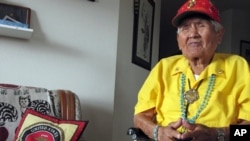Chester Nez, the last surviving U.S. Marine from the original unit of World War II Navajo Code Talkers, died early Wednesday in his home state of New Mexico. He was 93.
Nez - a 10th grader in 1941 who lied to recruiters about his age - and 28 other Navajo enlisted in the Marines shortly after the Japanese attack on Pearl Harbor.
The 29 recruits were later assembled to develop a communications code for use in the Pacific theater that could not be deciphered by the Japanese military. Few people spoke the language, and historians say the cipher was so successful that even those fluent in Navajo could not understand what was being said.
Nez and his fellow code talkers were honored at the White House in 2001 with Congressional Gold Medals.
Navajo President Ben Shelly ordered flags across the 71,000 square kilometer reservation in the American southwest lowered from sunrise Thursday to sunset Sunday to honor Nez.
In comments to the Associated Press in 2009, Nez described the wartime exploits of his fabled unit as "one of the greatest parts of [Navajo] history...that we used our own native language" to aid the Pacific war effort. "We're very proud of it," he said.
His wartime service included the 1942 landing at Guadalcanal, the battle of Bougainville in New Guinea, and combat in Guam, Angaur and Peleliu.
Some 400 code talkers would go on to use the battlefield cipher, encrypting messages for use in field telephones and radios across the Pacific theater.
Nez - a 10th grader in 1941 who lied to recruiters about his age - and 28 other Navajo enlisted in the Marines shortly after the Japanese attack on Pearl Harbor.
The 29 recruits were later assembled to develop a communications code for use in the Pacific theater that could not be deciphered by the Japanese military. Few people spoke the language, and historians say the cipher was so successful that even those fluent in Navajo could not understand what was being said.
Nez and his fellow code talkers were honored at the White House in 2001 with Congressional Gold Medals.
Navajo President Ben Shelly ordered flags across the 71,000 square kilometer reservation in the American southwest lowered from sunrise Thursday to sunset Sunday to honor Nez.
In comments to the Associated Press in 2009, Nez described the wartime exploits of his fabled unit as "one of the greatest parts of [Navajo] history...that we used our own native language" to aid the Pacific war effort. "We're very proud of it," he said.
His wartime service included the 1942 landing at Guadalcanal, the battle of Bougainville in New Guinea, and combat in Guam, Angaur and Peleliu.
Some 400 code talkers would go on to use the battlefield cipher, encrypting messages for use in field telephones and radios across the Pacific theater.






